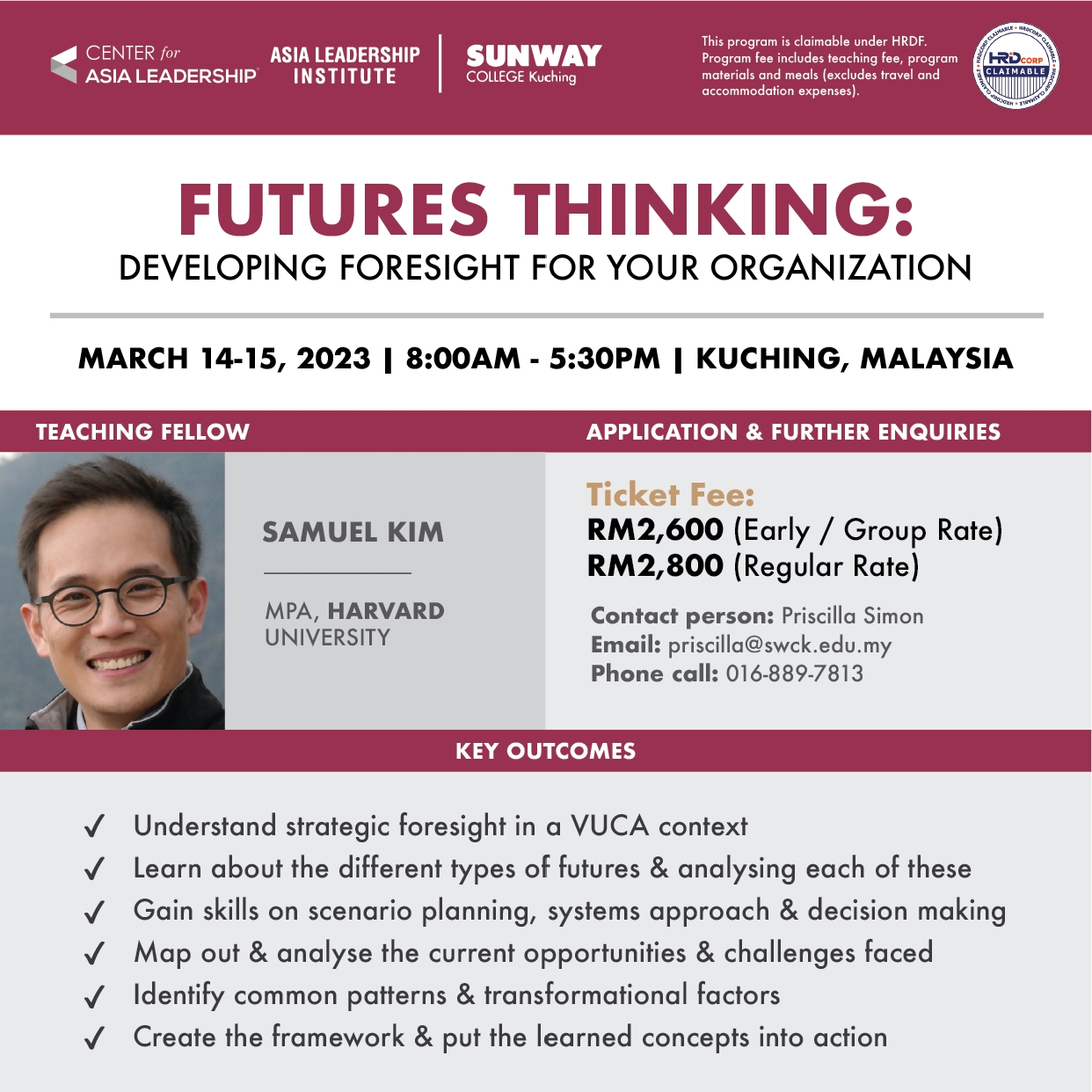WHO SHOULD ATTEND
It is designed for Working Professionals in Business, Government, International Organisations, and Non-Profit Organisations who hold mid- to senior-level decision making roles.
PROGRAM INFORMATION
Duration : 2 days
Date : March 14-15, 2023
Venue : Kuching, Malaysia
Investment: RM2,600 (Early / Group Rate)
RM2,800 (Regular Rate)
This program is claimable under HRDF. Program fee includes teaching fee, program materials and meals (excludes travel and accommodation expenses).
APPLICATION & FURTHER ENQUIRIES
Contact person: Priscilla Simon
Email: priscilla@swck.edu.my
Phone call: 016-889-7813
- Early application is encouraged. Candidates are admitted on a rolling, space-available basis. Because of the interactive nature of this program, the number of participants is limited.
- Full attendance is required for the registered participant to receive the certificate of completion. No transfer of registration is allowed after the commencement of the program. The organizer reserves the right to alter the information published in the best interest of the program
- Information is correct at the time of printing but may be subject to change at the organizer’s discretion.
- Terms and conditions apply.
INTRODUCTION
We are living in an era of constant rapid change, in which uncertainty and volatility will continue as the new norm even after COVID 19 has passed. Organizations are more concerned than ever about the future, and what we can and should do now to prepare for it.
Foresight is simply insight how and why the future will be different from today. Developing foresight is used to inform our vision of the future we want to achieve, so that we can design and execute strategy to make that future happen. We use strategic foresight in particular situations that are characterized as being in a VUCA (volatile, uncertain, complex, and ambiguous) context – scenarios which make our world largely unpredictable and the future fairly unknown.
In this workshop, participants will be guided in a framework with a step-by-step process, and equipped with toolkit, to examine the past and present within their market or industry, while building sensible scenarios for the future. The workshop will culminate with participants creating a ‘white paper’ based on the context their respective organisations are situated in with respect to opportunities and challenges they are facing.
OBJECTIVES
In this 2-day workshop, participants will be guided to apply the strategic foresight framework and toolkit in which they will:
A. Identify the Industry and Domain they are seeking to focus on;
B. Scan for Driving Forces and Trends affecting their domain;
C. Generate Scenarios, or plausible futures for their industry and domain;
D. Use Methods to Communicate these Futures across their teams and organization;
E. Devise Milestones to ensure success in these futures; and
F. Propose Action Steps that can be implemented now to start.
The main principles of foresight from a practitioner’s point of view will be shared, including an approach by which the participants can learn about the future and study trends, drivers and signals of change. Special emphasis will be given to scenarios, which are one of the main tools that are used.
METHODOLOGY
Participants will engage in plenary sessions, interactive workshops, and case discussions with Teaching Fellows from Harvard University and other world-leading institutions. The program also serves as a forum for networking and small group discussion by participants in discussing some of the challenges they are facing or have faced.
KEY OUTCOMES
Through the program, participants will:
- Understand the value of strategic foresight in a VUCA context and discover opportunities to apply it in their organization
- Learn about the different types of futures and the common patterns and transformational factors from which strategies can be developed
- Gain a toolkit of skills on scenario planning, systems thinking, decision making, and facilitating conversations on the future
AGENDA
| Time | Day 1 | Day 2 |
| 0800 | Registration | |
| 0900 | Introduction & Session 1: What is Strategic Foresight?
5 Things Thriving Organisations Do Well: Reality Check Exercise: Decline, Stagnation, Growth |
Session 6: Taking Cases to the Next Level
Futures Tool 3 – Scenario Planning & Implications Driving Forces of Change Case Studies |
| 1020 | Coffee Break | |
| 1040 | Session 2: 4 Steps to the Future
Futures Tool 1: Examining the Past – Layered Timeline |
Session 7: Forecast Scenarios
Generating Alternative Scenarios Based on 4 Archetypes |
| 1200 | Lunch | |
| 1320 | Session 3: Ways to Understand with Futurist’s Lens
Futures Tool 2: Observing the Present – Emerging Issues Analysis Exercise and Discussion |
Session 8: Aligning Strategy and Capabilities
Case Discussion: Developing Milestones to Ensure Success |
| 1420 | Break | |
| 1430 | Session 4: Translating Futures to Strategy
Group Exercise: Industry & Domain Discussion Case Study and Discussion |
Session 9: Future Applications
Communicating Insights and Options |
| 1530 | Coffee Break | |
| 1550 | Session 5: Group Exercise
Generating Your Own Case |
Session 10: Exercising Leadership in an Uncertain World Reflection and Discussion |
| 1650 | Break | |
| 1700 | Q&A and Debrief | Q&A and Debrief
Closing |
| 1730 | End | |
